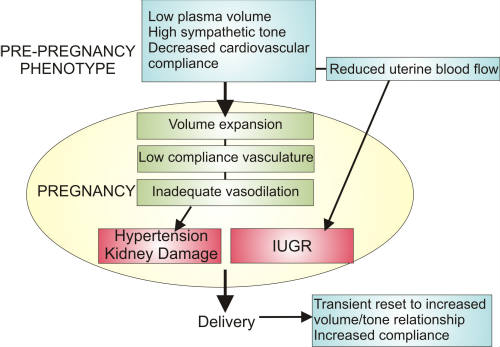Bernstein Lab Research
Area of Interest
Preeclampsia (PE) is a multi-organ disease that affects 3–8% of first pregnancies and is a major contributor to perinatal morbidity and mortality. PE is diagnosed by new onset hypertension (blood pressure >140/90) and additional end-organ injury and occurs after 20 weeks of pregnancy. The overarching theme in our laboratory is the evaluation of prepregnancy physiology and examining how it relates to pregnancy physiology and the development of PE. Normal pregnancy is associated with increased blood volume expansion of up to 50% without changes in blood pressure. We have hypothesized that there is a specific prepregnancy disposition, and an associated cardiovascular intolerance to volume expansion, which are important contributors to the development of preeclampsia.

We propose that the pathophysiologic sequence of PE results from a pathologic response to the physiologic adaptations of pregnancy when these adaptations are superimposed on a specific prepregnancy phenotype. We have suggested that chronic low plasma volume is associated with reduced vascular compliance and that this results in increased pressure/volume relationship as the volume expansion of pregnancy proceeds. Though we are primarily interested in the cardiovascular adaptation during pregnancy, we are also interested in the contribution of endothelial dysfunction, kidney function, subclinical inflammation as well as uterine blood flow to the development of PE. In our current study, evaluation of women occurs prior to pregnancy and during the first and third trimesters of pregnancy and includes the following:
- Cardiovascular evaluation including cardiac output, arterial compliance and uterine blood flow measurements and plasma volume assessment
- Inflammatory cytokine and endothelial dysfunction profile including biochemical markers and physiologic measures.
- Evaluation of the renin-angiotensin system
- Measurement of proteins within the coagulation and fibrinolytic systems
- Sympathetic tone assessment
- Evaluation of water movement and blood flow within the brain
Collaborators on the current grant include
Marilyn Cipolla, Ph.D., Department of Neurology
Kenneth Ward, M.D., Lucina Foundation
Our laboratory also has campus-wide collaborations with the following investigators
Stephen Higgins, Ph.D., Department of Psychiatry
Martin LeWinter, Ph.D., Cardiology
Cardiovascular Research Institute of Vermont (CVRI-VT)
Kathleen Brummel-Ziedens, Ph.D., Department of Biochemistry